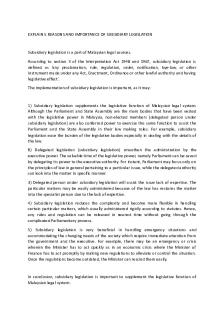Explain the importance of marriage for Elizabeth 1 PDF

| Title | Explain the importance of marriage for Elizabeth 1 |
|---|---|
| Author | Charlotte Corrigan |
| Course | Elizabethan England |
| Institution | Sixth Form (UK) |
| Pages | 1 |
| File Size | 44.1 KB |
| File Type | |
| Total Downloads | 69 |
| Total Views | 126 |
Summary
‘Elizabeth came to value and adopt the masculine qualities of dominance, aggression and fearlessness, which made it impossible for her to assume the subservient role expected of a wife’. L. Smith, Historian, 1984
How convincing if this interpretation of why Elizabeth never married? (8 m...
Description
‘Elizabeth came to value and adopt the masculine qualities of dominance, aggression and fearlessness, which made it impossible for her to assume the subservient role expected of a wife’. L. Smith, Historian, 1984 How convincing if this interpretation of why Elizabeth never married? (8 marks).
Marriage was incredibly important issue during Elizabeth’s reign. It was particularly important for a Queen to marry because in the Elizabethan era many believed that a Queen needed a husband to make political decisions for her, to lead her military campaigns and to provide her with strength as a ruler. One of the main reasons it was so important for Elizabeth to marry was due to a lack of an heir to the throne. This was a main concern amongst England’s Protestants as it would mean that if Elizabeth died, it would be unclear who would inherit the throne. The interpretation is convincing because Elizabeth could not rule effectively if she married. If she took a husband, he would rule for her. By not marrying, Elizabeth would not lose her authority. Angered by the interference she had from Parliament, she banned them from talking about it. Also, it was arguably not just the loss of power. Elizabeth was able to utilise the possibility of marriage to her advantage when dealing with foreign leaders and important figures in England. Failing to marry allowed Elizabeth to maintain loyalty from powerful men in England as well as, like the interpretation reveals, not having her authority challenged by her husband. Women were expected to defer their power to their husbands if they decided to marry. Moreover, the interpretation does not account for the loss of England’s power if she was to marry a foreign suitor. Also, by choosing a member of the English Nobility, she risked creating fear and resentment from those in her Privy Council who were not chosen. In addition, being a Protestant Country, it made marriage difficult for Elizabeth as she did not want to choose a Catholic suitor and undermine the religion of the country. Whilst the interpretation is convincing, it fails to recognise the political significance of choosing a foreign suitor, the risk of alienating English Nobles through choosing an English suitor and the consequence of choosing a catholic suitor against the backdrop of the antiCatholic ruling of England....
Similar Free PDFs

The Importance of Education
- 1 Pages

The importance of Jurisprudence
- 5 Pages

The Importance Of Biology
- 7 Pages

The Importance of Measurement
- 6 Pages

The Importance of Final Accounts
- 9 Pages

The Importance of Gun Control
- 4 Pages
Popular Institutions
- Tinajero National High School - Annex
- Politeknik Caltex Riau
- Yokohama City University
- SGT University
- University of Al-Qadisiyah
- Divine Word College of Vigan
- Techniek College Rotterdam
- Universidade de Santiago
- Universiti Teknologi MARA Cawangan Johor Kampus Pasir Gudang
- Poltekkes Kemenkes Yogyakarta
- Baguio City National High School
- Colegio san marcos
- preparatoria uno
- Centro de Bachillerato Tecnológico Industrial y de Servicios No. 107
- Dalian Maritime University
- Quang Trung Secondary School
- Colegio Tecnológico en Informática
- Corporación Regional de Educación Superior
- Grupo CEDVA
- Dar Al Uloom University
- Centro de Estudios Preuniversitarios de la Universidad Nacional de Ingeniería
- 上智大学
- Aakash International School, Nuna Majara
- San Felipe Neri Catholic School
- Kang Chiao International School - New Taipei City
- Misamis Occidental National High School
- Institución Educativa Escuela Normal Juan Ladrilleros
- Kolehiyo ng Pantukan
- Batanes State College
- Instituto Continental
- Sekolah Menengah Kejuruan Kesehatan Kaltara (Tarakan)
- Colegio de La Inmaculada Concepcion - Cebu









